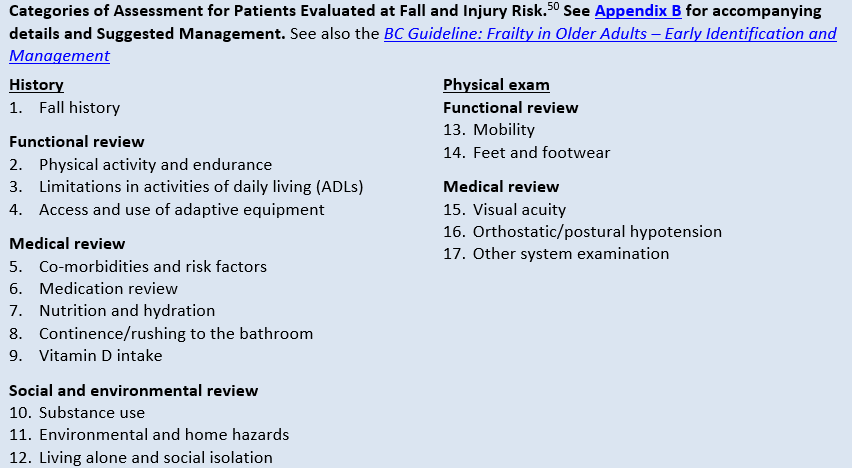More About Dementia Fall Risk
Table of ContentsNot known Details About Dementia Fall Risk Dementia Fall Risk Can Be Fun For EveryoneThe Of Dementia Fall RiskNot known Factual Statements About Dementia Fall Risk The 6-Minute Rule for Dementia Fall Risk
The FRAT has 3 sections: fall threat standing, risk element checklist, and action plan. An Autumn Threat Condition includes data about background of current falls, medicines, mental and cognitive status of the client - Dementia Fall Risk.If the person scores on a threat element, the matching number of factors are counted to the person's fall threat score in the box to the much. If a client's loss threat rating completes five or greater, the person is at high risk for falls. If the patient ratings just four factors or lower, they are still at some danger of dropping, and the nurse must use their finest scientific assessment to manage all loss threat aspects as part of a holistic treatment plan.
These common strategies, generally, assist establish a risk-free environment that decreases unintended drops and defines core safety nets for all people. Indicators are crucial for patients at risk for drops. Health care providers need to acknowledge who has the condition, for they are accountable for implementing activities to promote client safety and stop falls.
6 Simple Techniques For Dementia Fall Risk
Wristbands must consist of the individual's last and initial name, date of birth, and NHS number in the UK. Just red color must be made use of to signify unique individual standing.
Things that are also much may require the individual to reach out or ambulate needlessly and can potentially be a threat or add to drops. Assists prevent the individual from going out of bed without any type of assistance. Registered nurses respond to fallers' telephone call lights quicker than they do to lights initiated by non-fallers.
Visual disability can substantially cause falls. Hip pads, when worn properly, may reduce a hip crack when fall happens. Keeping the beds closer to the flooring lowers the danger of falls and severe injury. Putting the cushion on the floor considerably decreases loss risk in some health care setups. Reduced beds are developed to decrease the distance an individual drops after relocating out of bed.
Getting The Dementia Fall Risk To Work
Patients who are high and with weak leg muscular tissues who attempt to rest on the bed from a standing setting are likely to drop onto the bed since it's as well reduced for them to decrease themselves safely. Likewise, if a high client efforts to rise from a reduced bed without assistance, the client is most likely to fall back down onto the bed or miss the bed and drop onto the flooring.
They're designed to promote timely rescue, not to prevent drops from bed. Distinct alarm systems can also remind the patient not to stand up alone. Making use of alarms can likewise be an alternative to physical restraints. Apart from bed alarm systems, increased guidance for high-risk people also might help stop drops.

Individuals with a shuffling stride boost fall chances dramatically. To lower autumn danger, footwear must be with a little to no heel, thin soles with slip-resistant walk, and support the ankle joints. Recommend person to use nonskid socks to avoid the feet from moving upon standing. Motivate individuals to put on suitable, well-fitting shoesnot nonskid socks for motion.
The Dementia Fall Risk Diaries
Individuals, specifically older grownups, have minimized visual capability. Lights an unfamiliar atmosphere aids enhance exposure if the person should get up during the night. In a research study, homes with ample illumination report less drops (Ramulu et al., 2021). Improvement in lighting in the house might minimize loss rates in older adults (Dementia Fall Risk). Making use of gait belts by all healthcare companies can promote security when assisting patients with transfers from bed to chair.

Caretakers work for ensuring a protected, protected, and secure setting. However, studies showed very low-certainty proof that caretakers decrease fall danger in acute care healthcare facilities and only moderate-certainty that options like video clip tracking can minimize sitter usage without boosting fall danger, recommending that sitters are not as helpful as initially believed (Greely et al., 2020).
All About Dementia Fall Risk

Increased physical fitness reduces the threat for falls and limits injury that is sustained when fall transpires. Land and water-based workout programs might be in a similar way useful on balance and stride and consequently reduce the risk for falls. Water exercise may add a favorable benefit on equilibrium and gait for females 65 years and older.
Chair Surge Exercise is a simple sit-to-stand workout that helps enhance the muscles in the upper legs and butts and useful site boosts mobility and self-reliance. The goal is to do Chair Surge exercises without making use of hands as the customer comes to be stronger. See sources area for an in-depth instruction on just how to execute Chair Increase exercise.